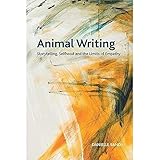Animal Writing : Storytelling, Selfhood and the Limits of Empathy / Danielle Sands.
Material type: TextSeries: Crosscurrents : CROSSPublisher: Edinburgh : Edinburgh University Press, [2022]Copyright date: ©2019Description: 1 online resource (224 p.)Content type:
TextSeries: Crosscurrents : CROSSPublisher: Edinburgh : Edinburgh University Press, [2022]Copyright date: ©2019Description: 1 online resource (224 p.)Content type: - 9781474439039
- 9781474439053
- 809.93362 23
- PN56.A64 S24 2019
- online - DeGruyter
| Item type | Current library | Call number | URL | Status | Notes | Barcode | |
|---|---|---|---|---|---|---|---|
 eBook
eBook
|
Biblioteca "Angelicum" Pont. Univ. S.Tommaso d'Aquino Nuvola online | online - DeGruyter (Browse shelf(Opens below)) | Online access | Not for loan (Accesso limitato) | Accesso per gli utenti autorizzati / Access for authorized users | (dgr)9781474439053 |
Frontmatter -- Contents -- Acknowledgements -- Preface -- Series Editor’s Preface -- Introduction: Ten Statements about Empathy and Animal Studies -- 1. Fragile Bodies, Cross-species Empathy and Suspended Allegories: ‘It hurt, it was painful – that’s all there is to say’ -- 2. Anthropomorphism and the ‘Ends of Man’ in the Anthropocene: ‘My chimp nature’ -- 3. Telling Nonhuman Stories: ‘The secret contours of objects’ -- 4. The Sexual Politics of Nature Writing and Lepidoptery: ‘The siren song of entomology’ -- 5. Insect Ethics and Aesthetics: ‘Their blood does not stain our hands’ -- Conclusion -- Bibliography -- Index
restricted access online access with authorization star
http://purl.org/coar/access_right/c_16ec
Navigates various literary and philosophical approaches to the representation of the nonhuman5 chapters each explore a different element of the human–nonhuman relationship by placing philosophical theories in dialogue with literary textsEncounters fiction writers Yann Martel, Karen Joy Fowler, Han Kang and Jim Crace beside the philosophy of Graham Harman, Donna Haraway, Jacques Derrida and Roger CailloisPursues underexplored facets of Animal Studies, particularly insects and their relationship to ecofeminismGenerates a conversation between Animal Studies and scholarship on objects, such as actor network theory and object oriented philosophyExplores the implications of the nonhuman for our understanding of aesthetics, ethics and politicsCombining recent insights from animal studies, critical plant studies and the new materialisms, Danielle Sands reads fiction and philosophy alongside each other to propose a method of thinking of and with animals that draws on a bestiary of affects. She challenges the claim that empathy should be primary mode of engagement with nonhuman life. Instead, she looks at the stories that we tell, and are told, by insects – beings at the edges of animal life. The indifference, even disgust, that these creatures evoke in us forms the basis for a new ethics not limited by empathy.
Mode of access: Internet via World Wide Web.
In English.
Description based on online resource; title from PDF title page (publisher's Web site, viewed 29. Jun 2022)


